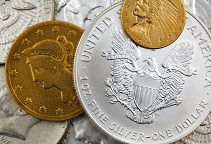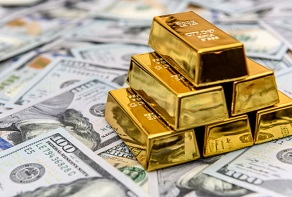Precious Metals News

Yahoo Finance: Gold on Pace for Weekly Win as Momentum Drives Historic 2025 Rally
Goldman Sachs analysts reiterated a "structurally bullish outlook for gold," with a price target of $4,900 by the end of next year.

Bloomberg News: Why Silver Price Has Been Surging Even More Than Gold
Heavy debt loads in major economies such as the US and a lack of political will to solve them also encouraged some investors to stock up on silver and other alternative assets this year.

Fox Business: 'Gold Rush' Star Warns Washington Has 'Zero Interest' in Fixing the Debt, Fueling a Massive Gold Boom
"I think that we're going to see a lot of very big structural support for gold prices, both from institutional traders, retail traders and central banks."

Barron's: Silver Is Soaring. Why the Rally Has Legs
"Retail demand is still clearly very healthy here, as is demand from reserve allocators seeking increased diversification. It is usually the case that one record high begets a few more, and that seems likely to ring true for silver."

Market Beat: Why Silver Beat Gold and the S&P in 202 - And What Comes Next
The world is using more silver than miners can dig out of the ground. 2026 is on track to mark the fifth consecutive year of a structural supply deficit.

The Wall Street Journal: Silver Hits Record High on U.S. Rate-Cut Bets, Supply Tightness
Investor interest in precious metals has surged in recent months, driven in part by concerns over rising debt levels in major Western economies and fears of currency devaluation.

Barron's: Central Banks Are Tilting Away From the Dollar. What They're Buying Instead.
Reserve managers don't want speculators to invest based on their moves, so they tend to say little about what they are up to. That gives added value to any reports about their views.

Benzinga: China's Secret Gold Play Fuels Goldman's $4,900 Target
Despite a stellar gold run in 2025, institutions are betting that the outperformance continues. With tight supply and sustained central bank buying. Goldman sees the yellow metal on track toward its $4,900 target for 2026.

Bitcoin.com: Robert Kiyosaki Frames Silver's Possible $200 Level Within His 2026 Outlook
The famous author reaffirm his belief that silver will play an increasingly important role as economic conditions evolve, particularly for individuals seeking protection from what he describes as systemic financial vulnerabilities.

Bloomberg News: Gold Prices Seen Topping $5,000 by End of 2026, JPM Private Says
The share of gold in investor portfolios "is still relatively small. Even if you get a higher share of investors to add just up to 5% in gold, that still presents further demand and likely further upside."
-
Forbes: China Chases Gold Supremacy as it Builds a U.S. Dollar Alternative
-
Market Watch: America's 'Sugar Daddy' Just Went Broke - And You're Stuck With the Bill
-
Bloomberg News: Copper and Silver Join Revamped US List of Critical Minerals
-
Eurasia Review: Gold's Flashing Warning - The End is Nigh for Fiat
-
Forbes: Choose Your Gleam: Gold Or Silver?
-
Investing Live: China's Hidden Gold Buying May Be 10x Official Data as De-dollarization Accelerates
-
Barron's: Gold's Rally Reflects the U.S. Deficit. Neither Is Ending Soon
-
Bloomberg News: Gold Hits Fresh Record on Fed Rate-Cut Hopes as Silver Surges
-
Business Insider: Why Investors Are Flocking to Silver and Platinum, Not Just Gold
-
Fortune: At This Rate, the Price of Gold Could Soar to $10,000 Per Ounce in Just Three Years
-
Fox Business: National Debt Surpasses $38 Trillion Milestone for First Time in US History as Spending Surges
-
Investing Live: In This Market, Just "Buy Shiny Stuff": SocGen
-
Investing.com: BofA Says Gold Rally Not Extreme, Next Target $5,000 by 2026
-
Market Place: A Shortage of Silver Has Prices for the Precious Metal Surging
-
Market Watch: Bank of America Now Sees $65 Silver, as Price Spike Reduces London Market to a 'State of Seizure.'
-
The Wall Street Journal: Gold Demand Climbs as Investors Seek Safe Havens, WGC Says
-
CNBC: Ray Dalio Says Today is Like the Early 1970s And Investors Should Hold More Gold Than Usual
-
Finbold: 'Rich Dad' R. Kiyosaki Reveals Where to Invest $100 Right Now
-
Forbes: Silver To Skyrocket: Retail Investors Drive Precious Metals to New Heights
-
Fortune: Gold's Price Record is Driven by the 'Debasement Trade,' China, And Fear of An AI Bubble, Analysts Say
-
Investing.com: Gold Eyes $4,000 Record, Silver Surges Towards $50 Milestone. Silver is making an equally impressive push toward $50/oz.
-
Investopedia: Gold Is Pricier Than Ever. Here's Why Experts See It Rising Even Higher
-
Market Watch: Billionaire Ken Griffin Warns on Consequences of Gold's Rally as Goldman Targets Nearly $5,000
-
Market Watch: When the World's Largest Asset Manager And the 'Bond King' Both Agree - Run to Gold, Silver and Bitcoin
-
Market Watch: Why This Veteran Investor Sees Gold Hitting $7,000 By the End of Trump's Term
-
Silver Academy: Francis Hunt Calls For $330 Silver
-
The Wall Street Journal: Silver Hits Historic $50 Mark as Investors Rush to Safety
-
CNBC: DoubleLine's Jeffrey Gundlach Believes Holding a 25% Gold Position isn't Excessive
-
CNBC: Ray Dalio Says Gold, Non-fiat Currencies Will Be Stronger Stores of Value As U.S. Debt Mounts
-
Reuters: Ray Dalio Suggests Gold as Shield for US Markets at Risk of Heart Attack
-
The Washington Examiner: Gold Prices Soar, Outperforming Stock Market Amid Economic Uncertainty
-
Fox Business: US Debt Tops $37 Trillion And the 'Big, Beautiful Bill' Allows it to Rise Trillions Higher
-
New York Post: Gold Smashes $3,500 Record as Rate-cut Bets, Policy Turmoil Fuel Haven Rush
-
Portfolio Adviser: Why Gold Will Continue to Shine
-
The Street: Here's How Gold Prices Can Reach $5,000
-
Ainvest: Peter Schiff Warns US Dollar Faces Imminent Collapse Amid BRICS Rise
-
Bloomberg News: China's Central Bank Adds Gold in Nine-Month Buying Streak
-
CNBC: Gold Regains Its Luster as Market Worries About a Pullback in Stocks
-
Forbes: Gold's Rally Was No Surprise - And It's Not Done
-
Fox Business: US National Debt Hits Record $37 Trillion
-
Investing.com: Ray Dalio Warns of Fiat Trust Breakdown, Says Gold Standard Return is Possible

